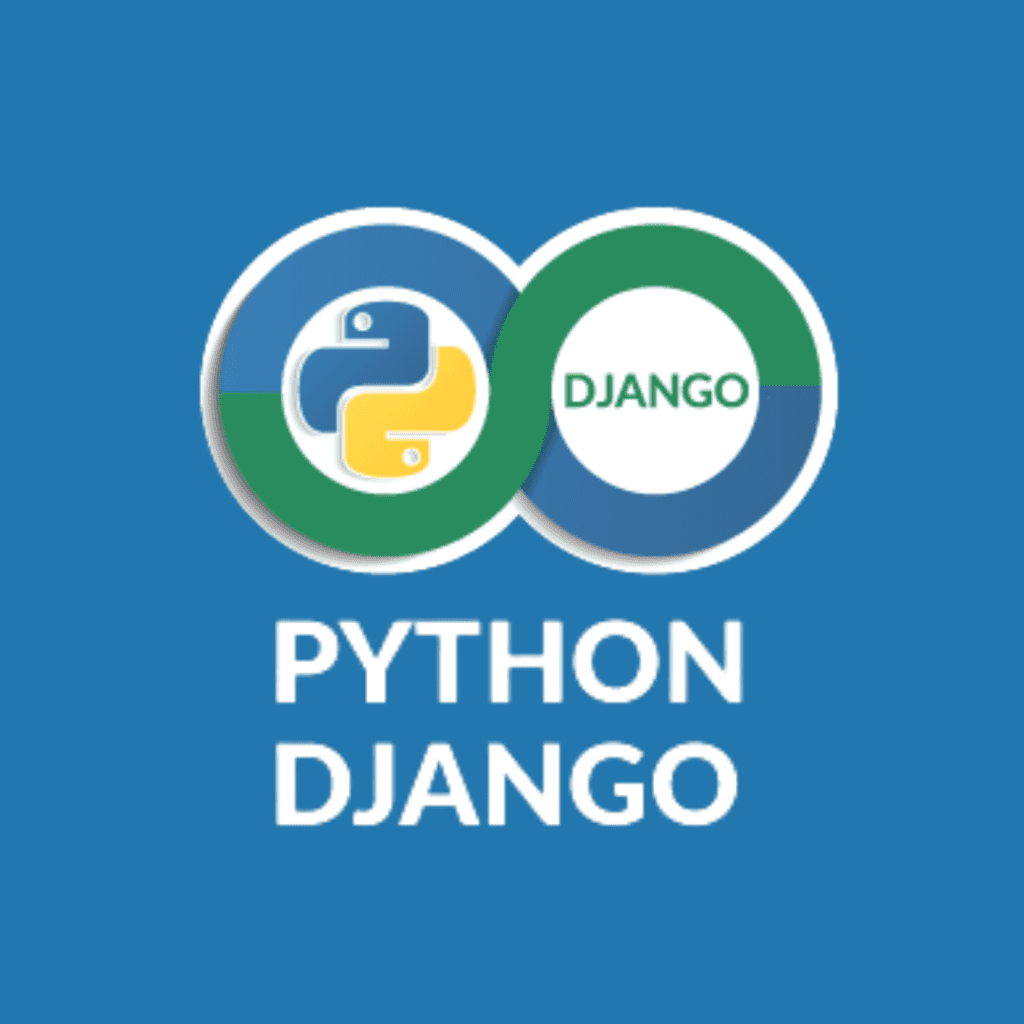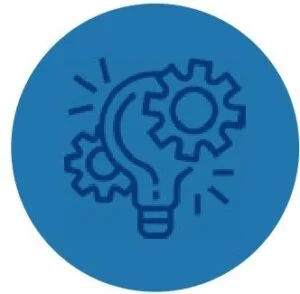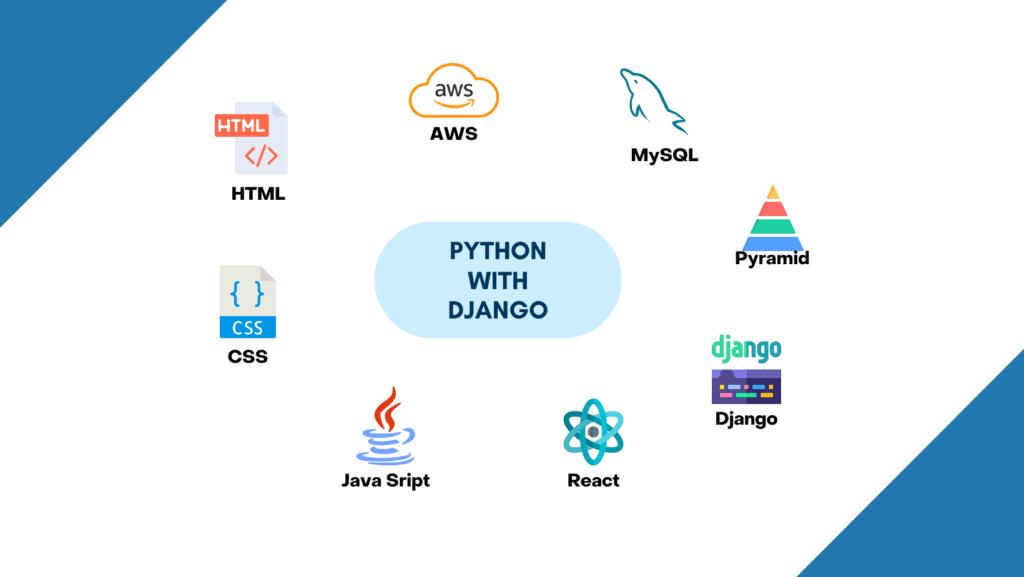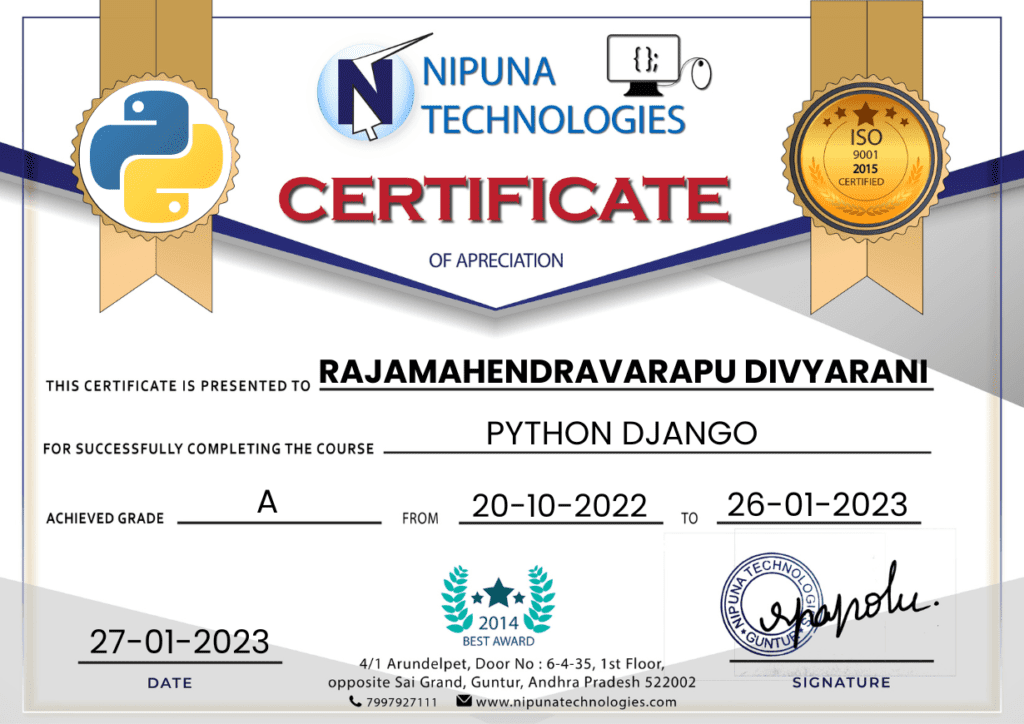Welcome To Best Python Django Course Institute In Guntur
- Get Certified from the Best Python Django Course Institute in Guntur
- Get trained by 10+ Years experienced trainers.
- 10+ real-time projects.
- Lab facility.
Students Enrolled
Duration

Job Opportunities After Completing Python Django Course in Guntur
Python Django Course is a simple, secure, and easy to learn programming language when compared to other scripting languages. Huge demand for Python Django developers & professionals assures more career opportunities because there has rapid growth for Robotics, Artificial Intelligence, DevOps, and Web Development which chose Python as the preferred programming language. Top-rated companies like Facebook, Pinterest, Instagram, Disqus, and other organizations including NASA use Python with Django.
If you are looking for better job opportunities as a developer, get training in Python Django. Because in the recent future, web developers will test and ensure the mastering skills in Python and advanced frameworks. Especially Django, helps in fetching up a career with various job opportunities, even to initiate a start-up with own products and services.
Software Engineer
Python Developer
Python Programmer
DevOps Engineer
Full-Stack Developer
Why Choose Nipuna Technologies for Python Django Course in Guntur ?
Our Python Django Course program has been designed by expert trainers for students to get the maximum in-depth knowledge with the support of our highly-skilled training team. This Python Django Courses is totally placement-oriented with more prominence given to real-time exposure. Nipuna Technologies is the best Python Django Course Institutes in Guntur offers job-oriented and placement Focused classrooms & Online Python Django Course in Guntur.We provide A/C Class Rooms, High Configured Lab & well Experienced Trainers. We also offer students the best Python Django training classes with real-time applications by the expert trainers in Guntur. The Python Django Training program at Nipuna technologies is specially designed for both Graduates and working professionals.
Key Features

Practice Labs For Real-Time Learning
Practice Labs makes it easy for you to put your learning into practice in a safe environment that you can access anytime with a compatible PC, Browser and Internet connection.

Live Project Training
We offer Live Projects and opportunity to take part in project design supported by industry partners including business and community organizations.

Classroom Training
We will use collaborative web conferencing with screen sharing to conduct highly interactive live online teaching sessions.

24/7 Support
Got queries? Our 24/7 support team will go extra mile so you can have easy and enjoyable experience with Nipuna Technologies on Slack which is a communication platform.

Job & Interview Assistance
Our interview assistance can help you overcome your fears and walk into your next interview with confidence and get your dream Job.

Internship After Course
Industry needs the best talent to stay afloat and thrive in today’s fast and ever-changing world, you will get a chance to do Internships and working closely that can provide a serious winwin for both Industry and students/trainees
Python Django Course Curriculum
List of all the topics which will be covered in Python Django Course
- Why do we need Python?
- Program structure
- Python Installation
- Execution Types
- What is an interpreter?
- Interpreters
- vs Compilers
- Using the
- Python Interpreter
- Interactive Mode
- Running python files
- Working with
- Python shell
- Integrated
- Development Environments (IDES)
- Interactive
- Mode Programming
- Script Mode Programming
- Types of Operators
- Python Arithmetic Operators
- Python Comparison Operators
- Python Assignment Operators
- Python Bitwise Operators
- Python Logical Operators
- Python Membership Operators (in, not in)
- Python Identity Operators (is, is not)
- Python Operators Precedence
1. Data Types
- Variables
- Assigning Values to Variables
- Multiple Assignment
- Python Numbers
- Python Strings
- Accessing Values in Strings
- String Special Operators
- String Formatting Operator
- Triple Quotes
- Built-in String Operations
2. Python Lists
- Accessing Values in Lists
- Updating Lists
- Delete List Elements
- Basic List Operations
- Indexing, Slicing, and Matrixes
- Built-in List Functions & Methods
3. Python Tuples
- Accessing Values in Lists
- Updating Lists
- Delete List Elements
- Basic List Operations
- Indexing, Slicing, and Matrixes
- No Enclosing Delimiters
- Built-in List Functions & Methods
4. Python Dictionary
- Accessing Values in Dictionary
- Updating Dictionary
- Delete Dictionary Elements
- Properties of Dictionary Keys
- Built-in Dictionary Functions & Methods
5. Loops and Decision Making
- A if statements
- else statements
- nested if statements
- while loop
- for loop
- nested loops
- Loop Control Statements
- break statement
- continue statement
- pass statement
6. Functions
- Defining a Function
- Syntax
- Calling a Function
- Pass by reference vs value
- Function Arguments
- Required arguments
- Keyword arguments
- Default arguments
- Variable-length arguments
- The return Statement
- Scope of Variables
1. Built-in module and functions
- Os module
- mkdir()
- chdir()
- getcwd()
- rmdir()
- listdir()
2. Constants
- Trigonometry
- Logarithmic
- Representation
3. Random module and functions random()
- randint()
- randrange()
- choice ()
- shuffle ()
4.Python Modules and Packages
- Framework vs Packages
- Folium Introduction
- Why are modules used?
- Creating modules
- The import Statement
- The from import Statement
- The from import * Statement
- Locating Modules
- The PYTHONPATH Variable
- Namespaces and Scoping
- The dir( ) Function
- The globals() and locals() Functions
- The reload() Function
- Packages in Python
- Constructing user defined packages
- Importing user defined packages
5.Basic OOPs Concept
- Creating class in Python
- Private Identifier
- Constructor
- Inheritance
- Polymorphism
1.Anonymous Function
- Lambda
- Map
- Reduce
- Filter
2. File Manipulation
- Opening Text File
- Working with a File on Python
- The open function
- File modes
- The file object attributes
- close() method
- write() method
- read() method
- Files: Input
- Files: Output
- Reading files
- Renaming & deleting files
- Writing into a file
- remove() method
3.Python GUI
- Basic Operations using Tkinter
- Buttons and Textbox
- Menu Bar
- Message Box and Radio Button
- Checkbox and Event Creating
- Creating Application in GUI
4. SQL and Python
- Overview of SQLite
- Integrating Python with SQLite
- Operations
1.Other Concepts
- Errors and Exception Handling
- Standard exceptions
- Assertions in Python
- The assert Statement
- What is Exception?
- Handling an exception
- Syntax
- The except
- Clause with No Exceptions
- The except Clause with Multiple Exceptions
- The try-finally Clause
- Argument of an Exception
- Example with Tkinter Application
- Regular Expression
2. Advanced Concept –Overviews
- Basics of Pandas and Numpy
- How to use Anaconda
- How to create dashboard
- Overview of Django
- What Is a Web Framework?
- The MVC Design Pattern
- Django’s History
- Installation of Django
- Installing Python
- Installing Django
- Setting Up a Database
- Starting a Project
- The Development Server
- Django Commands Overview
- Your First View: Dynamic Content
- Mapping URLs to Views
- How Django Processes a Request
- URL configurations and Loose Coupling
- 404 Errors
- Your Second View: Dynamic URLs
- A Word About Pretty URLs
- Wildcard URL patterns
- Django’s Pretty Error Pages
- Template System Basics
- Using the Template System
- Creating Template Objects
- Rendering a Template
- Multiple Contexts, Same Template
- Context Variable Lookup
- Playing with Context Objects
- Basic Template Tags and
- Filters Tags
- Philosophies and Limitations
- Using Templates in Views
- Template Loading
- render_to_response ()
- The locals () Trick
- Subdirectories in get template ()
- The include Template Tag
- Template Inheritance
- The “Dumb” Way to Do Database Queries in Views
- The MTV Development Pattern
- Configuring the Database
- Your First App
- Defining Models in Python
- Your First Model
- Your First Model
- Installing the Model
- Basic Data Access
- Adding Model String Representations
- Inserting and Updating Data
- Selecting Objects
- Filtering Data
- Retrieving Single Objects
- Ordering Data
- Chaining Lookups
- Slicing Data
- Deleting Objects
- Making Changes to a Database Schema
- Adding Fields
- Removing Fields
- Removing Many to Many Fields
- Removing Models
- Activating the Admin Interface
- Using the Admin Interface
- Users, Groups and Permissions
- Customizing the Admin Interface
- Customizing the Admin
- Interface’s Look and Feel
- Customizing the Admin Index Page
- When and Why to Use the Admin Interface
- Search the “Perfect Form”
- Creating a Feedback Form
- Processing the Submission
- Custom Validation Rules
- A Custom Look and Feel
- Creating Forms from Models
- Exception
- Using Generic Views
- Generic Views of Objects
- Extending Generic Views
- Making “Friendly” Template Contexts
- Adding Extra Context
- Viewing Subsets of Objects
- Complex Filtering with
- Wrapper Functions
- Performing Extra Work
- Template Language Review
- Request Context and Context Processors
- Django Core context processors. auth
- Django core context processors request
- Guidelines for Writing Your Own Context Processors
- Inside Template Loading
- Extending the Template System
- Creating a Template Library
- Writing Custom Template Filters
- Writing Custom Template Tags
- Cookies
- Getting and Setting Cookies
- The Mixed Blessing of Cookies
- Setting Test Cookies
- Users and Authentication
- Enabling Authentication Support
- Using Users
- Logging In and Out
- Limiting Access to Logged-in Users
- Managing Users, Permissions and Groups
- Using Authentication Data in Templates
- Permissions
- Groups
- Messages
- Profiles
Python Django Course Tools & Platforms

Certifications
CERTIFICATION
Our training is based on latest cutting-edge infrastructure technology which makes you ready for the industry. Nipuna Technologies will present this certificate to students or employee trainees upon successful completion of the course which will encourage and add to trainee’s resume to explore a lot of opportunities beyond position.

We also provide Courses Like: Microsoft azure Course Guntur | 3DS Max Course Guntur | | Web Development Course Guntur | Ansys Course Guntur | Android App Development Course Guntur | PHP MYSQL Course Guntur |















